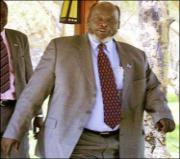Sudan’s VP, rebel chief continue thorny peace talks in Kenya
By Bogonko Bosire
NAIVASHA, Kenya, Sept 7 (AFP) — Talks on Sunday between Sudan’s Vice President Ali Osman Taha and southern rebel leader John Garang to end two decades of civil war were stymied on key “contentious issues”, officials said.
 A source close to the talks said Taha and Garang, leader of the rebel Sudan People’s Liberation Army (SPLA), had so far failed to make progress during their first face-to-face talks, now in their fourth day.
A source close to the talks said Taha and Garang, leader of the rebel Sudan People’s Liberation Army (SPLA), had so far failed to make progress during their first face-to-face talks, now in their fourth day.
“There seems to be a deadlock on the contentious issues, but the two leaders are meeting to try to break the impasse,” said the source who asked not to be named.
“Generally we can say the areas of disagreement outweigh the areas of agreement,” he added.
But another IGAD official who spoke to AFP on condition of anonymity said Taha and Garang had made progress on less significant issues.
“They seem to be making progress on small matters like basic freedoms and other human rights issues, but still there is a major rift in power sharing and the three regions,” he said.
The two leaders are trying to break a deadlock on how to share power and resources during an already agreed six-year interim period of self-rule for southern Sudan, which will be effected when a comprehensive peace accord is signed.
A senior official in the mediating team, which is made up of officials and diplomats from member states of the regional Intergovernmental Authority on Development (IGAD), warned that the entire peace process might collapse if Garang and Taha failed to agree.
“If this leadership consultation fails, that will be tantamount to throwing the whole process into a crisis,” said the official, who asked not to be named.
The sharing of oil revenues was proving especially controversial, according to one mediator.
“The government is ready to share wealth, but the SPLA wants to take a higher ratio of the wealth, especially oil, arguing that there is nothing (else) in the south and the government has always benefitted,” said an IGAD official.
Sudan produces some 300,000 barrels per day of crude from fields in the centre of the country near the front line with the SPLA, but experts say it has the potential for much higher output.
The SPLA is pushing for 60 percent of oil revenues and 40 percent of government jobs during the interim period, according to a report by Egypt’s official MENA news agency last month.
Another bone of contention is the three disputed areas — the Southern Blue Nile State, Abyei, and the Nuba Mountains in the centre of the country — where rebels are active although the areas are not geographically part of the south.
The SPLA claims that it has the mandate from the three territories to represent them at the talks, but Khartoum says that it controls 90 percent of those areas.
Another stumbling block in the talks is the government’s opposition to a clause in the IGAD draft deal providing for a separate army for the south during the interim period, under Garang’s leadership.
Khartoum argued that the clause paved the way for the immediate secession of the south.
The 20-year-old conflict between the Muslim-dominated regime in Khartoum and the mainly Christian or animist SPLA, Africa’s longest-running civil war, is estimated to have killed at least 1.5 million people and displaced another four million.
